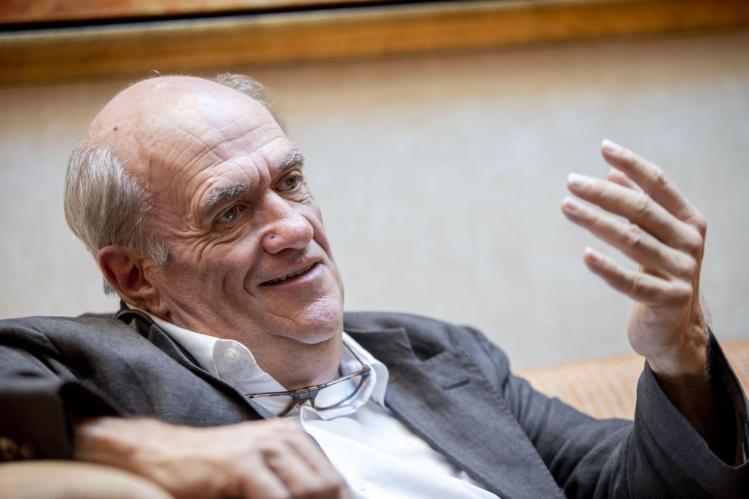
For a writer of his generation, Colm Tóibín might be the closest thing to a celebrity the twenty-first century is capable of producing. The source of his popular appeal, however, can be a little tricky to pin down. Tóibín’s novels are often understated and elliptical, driven more by small human interactions than by plot. His most critically acclaimed work, 2004’s The Master, is a dense, involuted treatment of the life and emotional weather of Henry James as the specters of old age and death loom. Even his most commercially successful novels, including Brooklyn (2009) and Nora Webster (2014), are far frostier and stranger than their warm popular reception would lead you to believe.
Though Tóibín is most famous as a novelist, he’s also a prolific and omnivorous essayist, regularly turning out lengthy pieces of criticism and cultural commentary for publications like the London Review of Books and the New Yorker. Over the past three decades, he’s published a celebratory homage to the city of Barcelona; travelogs detailing a walking tour along the Irish border and investigating the state of European Catholicism in the mid-1990s; studies of the Irish dramatist Lady Gregory and the American poet Elizabeth Bishop; and themed essay collections on the lives of gay artists, writers and their families, and (of course) Henry James.
In a way, it’s surprising that a writer so prolific shouldn’t have a Selected Essays, but the peculiar qualities of his criticism, which tends to be information-dense and quote-heavy, might offer an explanation. Tóibín doggedly pursues his own curiosities, leaping down rabbit hole after rabbit hole and reveling in the warren. That his earliest nonfiction outings, including Bad Blood: A Walk Along the Irish Border and The Sign of the Cross: Travels in Catholic Europe, were essentially peripatetic pieces of journalism makes sense. A leisurely stroll is the clearest model for his nonfiction style.
His latest collection, A Guest at the Feast, comes closest to being a general compendium, though its contents are weighted in favor of a particular subject of abiding interest to Tóibín: religion. The book is anchored by three essays on popes, and three essays on writers concerned, in one way or another, with religious themes. This may seem odd to some readers, since religious themes aren’t terribly prominent in Tóibín’s novels, where they emerge (if they emerge at all) in oblique ways—for example, as imposed silences, dictating what may and may not be said. Unsurprisingly, the collection as a whole is interested in “religion and its shadowy aftermath,” to borrow a phrase from Tóibín’s essay on Marilynne Robinson. Dealing with the shards of a religious tradition, as Tóibín’s essays make clear, can be intensely clarifying—after all, when things break up, they are quite literally made particular, and can be examined from all angles.
The collection’s title essay, a rambling piece of psychogeography, offers a magpie’s view of Tóibín’s artistic development. He quotes writers he admires, recounts the history of landmarks in his native Enniscorthy, and drinks his way through his student days in Dublin. At one point, he recalls finding a stash of forbidden books above his mother’s wardrobe, including Edna O’Brien’s The Country Girls and John McGahern’s The Dark. These texts, “samizdat Irish-style,” are tokens of “a great unsettling,” the seismic cultural shifts that occurred as Ireland opened itself to the world in the 1960s. The essay’s discontinuous, mosaic-like structure, treating every fragment of experience with equal weight, is a reflection of this disturbance. Tóibín is attempting to capture a culture, and a self, that has been fractured and riven by deep changes.
There’s always been something clinical about the tone of Tóibín’s writing, a severity that insists on the raw accretion of facts. At its worst, this tendency can make his essays feel like little more than collections of quotations. Elsewhere, it provides a powerful charge. “A Brush with the Law,” which recounts Tóibín’s fascination with Ireland’s Supreme Court, is a case in point. The essay’s lengthy explanations of court cases dealing with homosexuality bear a clear edge. Tóibín’s real aim is to demonstrate how religious ideas get filtered through the legal system, how legal arguments against homosexuality are often just moral arguments in disguise. In a sense, his method elevates pedantry to a moral art.
This understanding of religion as a richly material, specific, and grounded thing gives shape to the collection’s contents. Structured religion is, naturally, political, as Tóibín’s essay on Pope Francis, which charts the prelate’s maneuverings and continued silence during and after Argentina’s Dirty War, makes clear. Despite Francis’s reputation as “a poster boy for informality, humility and good-natured cheerfulness,” in Tóibín’s estimation he is fundamentally a shapeshifting figure, capable of an almost ecstatic vacillation. “Bergoglio could play the anarchist one moment and the next revert to his role as authoritarian,” he writes. That this degree of vacillation, the absence of a coherent center of thought and action, might be central to a successful papacy in the twenty-first century is the essay’s unspoken fear, one borne out by the fate of Benedict XVI, a deeply intellectual prelate firmly committed to theological revanchism.
Tangling with the paradoxes of religious life provides the foundation for many of the collection’s most powerful pieces, including, naturally, “The Paradoxical Pope,” Tóibín’s’s searching analysis of John Paul II. Written for the New Yorker in 1995, the essay appeared at a time when it seemed the Polish pope was on the way out, and there was the hope of massive reform in the Church. This focus on a moment of illusory optimism makes the essay a strange, almost autumnal read—after all, we know that John Paul II held on for another decade, and that he was replaced by Ratzinger, who was in some ways even more conservative. At the same time, it’s a remarkably prescient essay, a powerful example of Tóibín’s interest in the forces of compromise, which allow things to appear to change while really staying the same.
John Paul II, as Tóibín portrays him, was “a master of ambiguities.” His public performances late in life were defined by a dialectic of frailty and sudden strength, a “mixture of bemusement and power,” which Tóibín suggests was central to their appeal. His standard move of “on the one hand, forbidding debate, and, on the other hand, seeming sympathetic and open” cloaked the Catholic Church in a deceptive air of flexibility during a period of great geopolitical changes. Like the Catholic Church itself at the end of the long twentieth century, Tóibín is fascinated by the fact that, as John Paul II “grows weaker, the light in his eyes strengthens, and his performances become more powerful and fascinating.”
The collection is rounded out by a handful of essays on writers. “Putting Religion in Its Place,” an essay on Marilynne Robinson, is concerned with the question of how religion is to be treated in a novel. Tóibín seems to settle for a clear and relatively simple answer. “Making religious thought easy is part of the genius of Gilead,” he writes, and notes of Home, Robinson’s third novel, that in spite of her “interest in religion, the predicaments dramatized in the book—including the religious ones—are rendered mostly in human terms.” What Tóibín is praising is essentially embodiedness, which is exactly what makes most realist fiction successful: the religious or the social or the political (and so on) is made granularly present in the minds of the characters. There’s something slippery about Tóibín’s treatment of his subject, a lack of clarity in his own chosen terms, which is perhaps why the essay contains lengthy asides on a number of other writers, including Henry James and Ernest Hemingway. It’s as though Tóibín is a touch uncomfortable dealing with Robinson’s honest religiosity.
The most riveting essay in the collection is likely “Issues of Truth and Invention,” on the Irish novelist Francis Stuart, who during World War II delivered radio broadcasts from Berlin that were intended to convey German propaganda to his homeland (though he refused to make any anti-Semitic statements). Stuart managed to have a successful career after the war, publishing several novels that dealt with his experiences—whether unsparingly or not is still a matter of debate. Tóibín became a close acquaintance of Stuart’s toward the end of his life, and his attempts to wrangle with Stuart’s messy literary legacy propel the essay. But Stuart seems irreducible, and Tóibín is led down a path of generalizations. In his postwar novels, Tóibín writes, Stuart “created versions of himself and versions of the war and its aftermath that redeemed him, inasmuch as they could, from the ordinary guilt or blame that might attach to collaboration.” Behind this was Stuart’s need “to believe that he had gained something spiritual, some new insight into the human condition, during and after the war.”
These are sharp observations, and they cast a few brilliant patches of light onto the shadowed monolith of Stuart’s psyche. But a far more affecting note is struck at the start of the essay, when Tóibín is recalling his own memories of the elderly Stuart and his wife, Madeleine: “I knew they both lived in the shadowy spaces between knowledge and forgiveness; their response to this was not simple, and I never fully understood it, and I still don’t.” There is a sense, here, of abiding in mystery, of a magisterial silence scrupulously maintained—in a way, a fundamentally religious posture. Silence, in particular, has a paradoxical grace to it—it models the virtue of forbearance, but at the same time can be a product of conservative forces and inclinations, or of fear. But there are different types and qualities of silence. Bergoglio’s silence, one senses, was simple, an absence of noise. Stuart’s was something more complex, an immanent force, closer to a prayer than anything else. It’s no surprise that Tóibín would be drawn to it, like a moth to a votive flame.
A Guest at the Feast
Colm Tóibín
Scribner
$28 | 336 pp.
